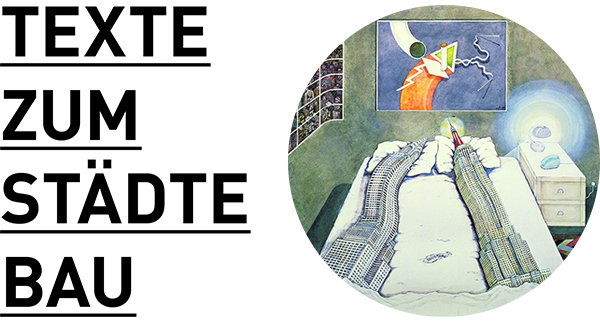SEITE DRUCKEN
LEHRE
FALLSTUDIEN ZUM URBANEN RAUM: WAHLFACH HS16

Kevin Lynch asserts that the purpose of urban design is ‘good city form’ (1981). In this reading seminar we will investigate what role utopian thinking might play in reaching this goal, based on the discourses on urban utopias and on urban form theories.
In his opus, Urban Utopias in the Twentieth Century (1977), Robert Fishman introduces three categories of urban utopias: ideal cities (radically original urban designs with revolutionary program for social change, such as Ebenezer Howard’s Garden City), utopian romances (technical exercises without explicit social agenda, such as the technological utopias of Archigram), and urban ideologies (projects that could be carried out without revolutionary social change, such as designs produced by totalitarian regimes).
Following Fishman’s theoretical grid, we will read concepts from each of his rubrics, while considering utopian design thinking within a broader and more fundamental discussion about the means and ends of urban design. While doing so, we will also confront utopias with critical approaches that could be described as pragmatic. Jane Jacobs, for example, argues that utopias demand totalitarian control, whereas urban neighborhoods should be developed and rejuvenated employing bottom-up approaches.
We will ultimately link the studied concepts with various urban forms, such as the megastructure in relation to technological utopias or the Manhattan block in Rem Koolhaas’ interpretation.
In his book Finding Lost Space (1986) Roger Trancik identifies three major approaches to theories of urban form: the figure-ground, linkage, and place theories. We will classify each of the discussed forms into the above three categories. Thus, we will wrap up the class with a basic grid on form theories – after having started it
with another one regarding utopian visions.
After an introductory lecture, we will discuss one edited text each week, and confront the different positions they represent with each other. Accordingly, participants will be expected to read one text and write a half-page response each week, to once prepare and hold a 15-minute presentation of a text (including a compact handout), and to actively participate in the discussions. Optionally, 10 to 15-page position papers can be written after the semester as elective theses, honored by additional credit points. A reader with selected texts and thematic introductions will be provided.
CLASSES: Thursdays, 4–6 PM
ROOM: HIL C 10.2
INTRODUCTION: Thursday, 22.9.2016, 4 PM
LANGUAGE: English
PARTICIPANTS: Max. 30
Mystudies: 051-0667-16L
ECTS: 3 credit points
LECTURER: Daniel Kiss
